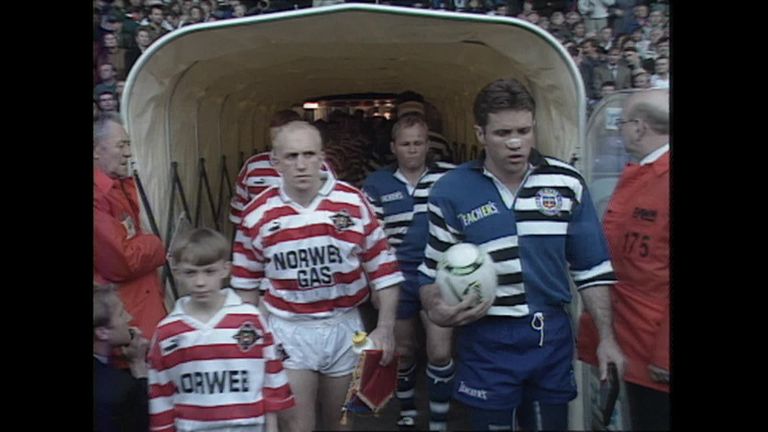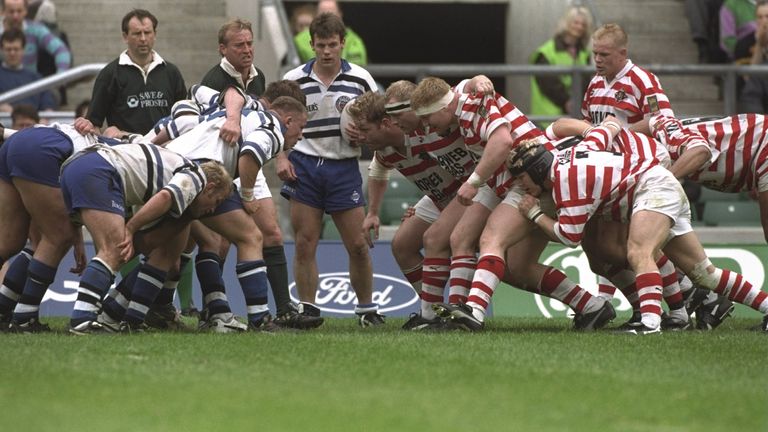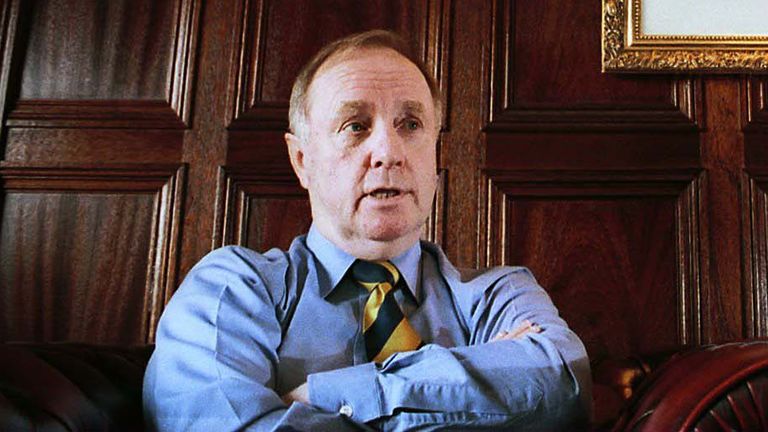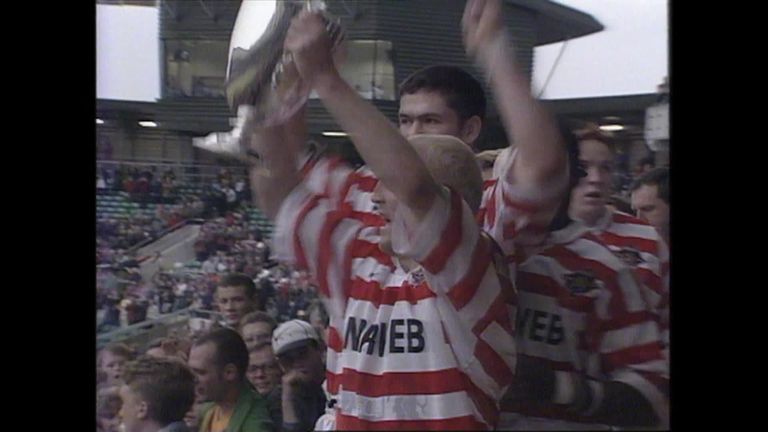Clash of the Codes: Wigan vs Bath what the papers said
Memories from May 1996, as Bath are hailed for showing "pride and spirit" under rugby league rules while Wigan's Henry Paul wins praise from union writers
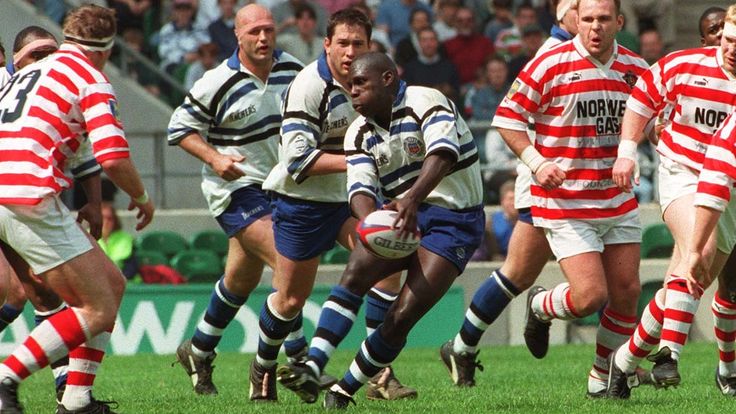
Saturday 9 May 2020 12:48, UK
We take a trip back in time and look at what the reaction was to Wigan and Bath's historic 'Clash of the Codes' fixtures in May 1996...
The matches were able to take place as a result of rugby union being declared an 'open' sport in the summer of 1995, ending a century of division between the two codes formed along the lines of union's previously strict amateur ethos.
That meant players in the 15-man code could receive payment for playing without fear of banishment and, when the matches were confirmed in January 1996, The Bolton News reported they "could generate a £2m cash bonanza".
- Wigan vs Bath: Where are they now?
- Harrison's 'Clash of the Codes' memories
- Wigan vs Bath: When rugby's wall came down
They were set for May 8 and 25 at Maine Road and Twickenham respectively, with the league leg taking place first and the encounter under union rules, sandwiched by the Cherry and Whites making more history by appearing in the Middlesex Sevens.
The prevailing wisdom at the time was each side would dominate in their respective codes, with The Independent's Steve Bale noting: "Wigan are 1/10 (if you bet £10 you stand to win only one pound) to win under league rules, with Bath at 6/1. Bath are the 4/11 favourites to take the union contest, with Wigan at 2/1."
And so it came to pass, with Wigan triumphing 82-6 in the first match at Maine Road, and Bath emerging 44-19 victors at English rugby union's headquarters.
Martin Offiah's six-try haul as the league side triumphed in Manchester saw him grab the individual headlines, although Bath's efforts saw them earn plenty of plaudits as well.
Under the headline 'Martin pulls the plug on Bath', the Liverpool Echo reported: "The historic first cross-code challenge ended with the inevitable easy victory for Wigan, defeat but no disgrace for Bath, and a glorious six-try haul for Martin Offlah."
Meanwhile, the Bolton News noted: "That takes nothing away from Bath's performance. It was full of pride and spirit and they never let their heads drop, despite being completely outplayed in a game totally alien to them.
"England internationals Phil de Glanville, Jonathan Callard, Mike Catt and Andy Robinson worked tirelessly but their efforts were in vain against a Wigan outfit determined to put the double rugby union champions firmly in their place."
There was a mood of conciliation between the two codes in reports from the time as well, with Bale's Independent colleague Peter Corrigan, writing in the Sunday edition following the first match, hailing the thawing of hostilities.
"This is what we should be celebrating this weekend," Corrigan wrote. "The end of hatred, jealousy and bigotry. Not that these qualities will disappear from the world of rugby - there has been plenty of evidence from both codes that they are raising their snarling heads elsewhere.
"But the match at Maine Road on Wednesday, plus Wigan's appearance in the Middlesex Sevens at Twickenham yesterday, signals the welcome end of the most immoral and detestable blemish sport has suffered since it first took on an organised structure a century or more ago."
However, Dave Hadfield was one of those who believed the result showed Wigan's professionals may have a chance of upsetting a Bath side which was still amateur in the return leg.
"It was not real rugby league, but after 101 years it was enjoyable enough as a novelty. Few will regard Bath as entirely safe on union territory in 16 days' time," Hadfield wrote in his match report.
But despite Craig Murdock finishing twice from length-of-the-field counter-attacks at Twickenham, and cross-code star Va'aiga Tuigamala going over as well, it was Bath's turn to shine in the return leg and show why they were the premier team in their code, just as Wigan had done in the first match.
"Bath showed Wigan that union was perhaps a bit more complex and demanding than they had expected and Wigan showed the Bath and union faithful what a fit and professional outfit they were," noted Bath's club records, adding: "A good day was had by all."
Ireland's Sunday Independent carried a report of the clash too, emphasising how Wigan's unfamiliarity with the laws of union had proven costly for them.
"Short penalties would pose a problem for Wigan whose skills rely on running, withstanding tackles, more running, and support," stated their report. "Wigan were ragged at times and a bit bewildered as Bath concentrated on the skills and ploys of the union game."
There was even talk of the following year's rugby league Challenge Cup final being played at Twickenham if Wembley were unavailable - something which did come to pass in 2001 and 2006 while the latter was being redeveloped.
Meanwhile, RFL chief executive Maurice Lindsay made the bold prediction to the assembled media post-match that: "The games this month have highlighted the big differences that exist, but it's difficult not to imagine that the codes will come closer together over the next five years and that one code will be in existence at the end of that period."
As we know, 24 years on, the two codes remain very much separate, yet Wigan had already won plenty of admirers and respect for the way they performed as they triumphed in the Middlesex Sevens the week before.
Henry Paul - the New Zealander who would later represent England at rugby union - particularly earned praise from the union aficionados present, with The Independent's Chris Hewitt writing: "Forget Jonah Lomu, Zinzan Brooke and the latest Kiwi hero, Christian Cullen, for a moment. This man would grace any All Black outfit, be it at sevens or fifteens."
As for the outcome of this coming together of league and union, former cross-code international Jonathan Davies was prescient in his belief there was much the 15-man game could learn.
"The way we've been playing union in Britain has not been beneficial to us on the world stage and, perhaps, now we've seen at close hand what professionalism can do, we can expect an improvement," Davies wrote.
"The Australians for years have realised that they have much to learn from the other code. It is no surprise, therefore, that they've been world champions at both."
